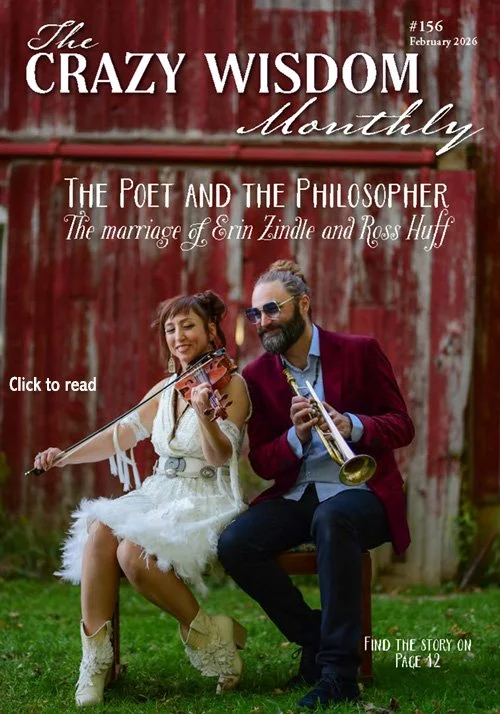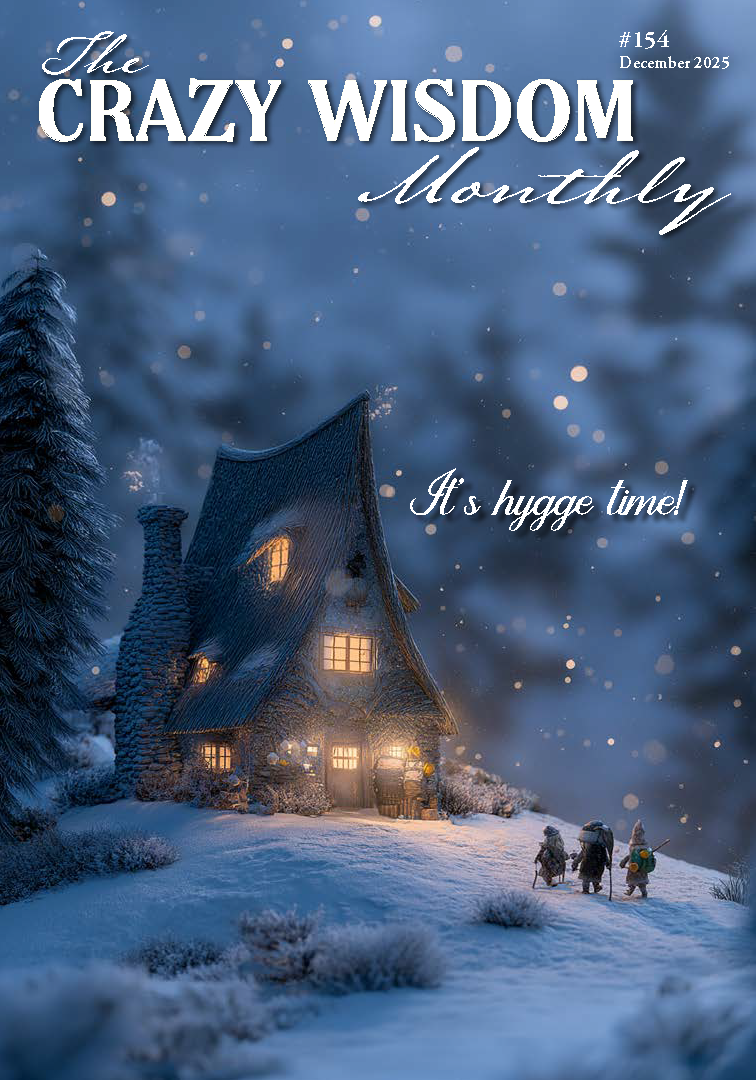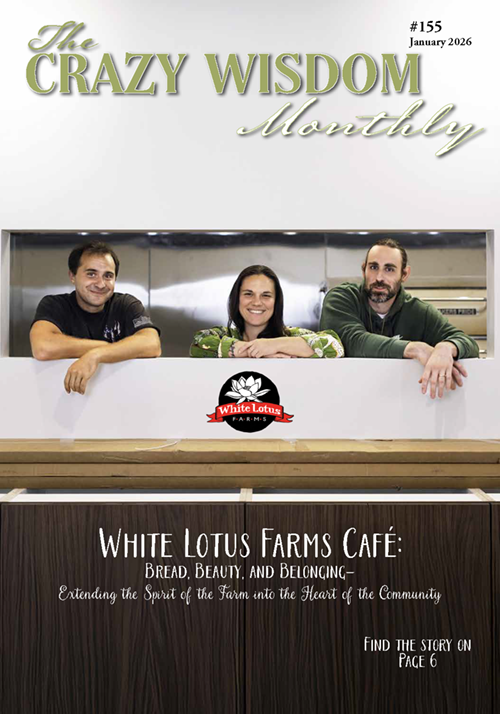The Crazy Wisdom Community Journal asked a number of leaders in southeastern Michigan’s conscious living community to reflect upon times in their lives that they’ve left their comfort zones to venture out in new ways. In the distant past or much more recently, we asked, what did you do, what inspired you, did it change you, inside or outside, big or little? Did you attend a new class, take an adventurous trip, go skydiving, stretch beyond a long entrenched boundary, start a new relationship or end an old one, take a leap, retire, join the Peace Corps, go on a night trek in the wilderness, or just do something way out of the ordinary?
Being a Parent to a Parent
Wasentha Young possesses a comprehensive and diversified background in art, writing, and mind/body/spirit practices (Tai Chi, Meditation, Qigong), that allows her to service individuals, universities, retreat centers, and corporate entities in the fundamental methods in building self-care and innovative lifestyles. You can learn more about her work at peacefuldragonschool.com, wasentha.com, or wasenthasmosaics.com.
By Wasentha Young
I couldn’t find her anywhere. I went to all the places where she could be, asked store clerks, drove by frequented bus stops and walking patterns, and then went back to her apartment. In her bedroom I found her mobile phone, apartment keys, and her ID. I was uncomfortable and a bit in a panic. How long should I wait before I call the police? My brain said “long enough.” I made the call.
The night before she sounded quite distressed. I went to her home and found she had barricaded herself in her apartment and demanded that if I was who I said I was that I use my key. I went back to my car, got my key, and pushed the door open. We talked for a while. She kept saying, “Nobody is taking me away and putting me into a hospital.” I assured her that that was not happening, settled her down for the night, and went home. First thing the next morning I called to check on her—and called and called. I had this sinking feeling that all was not well.
Having reached the police, I explained that I had not been able to locate my mother for at least four hours and that was unusual. I asked how long I had to wait before I could file a missing person report. They said that with the elderly, right away. When I gave the officer her name he said, “Ah, yes I have her name here. She is at St. Joe’s. We found her in the street in a state of hyper paranoia.”
Off to St. Joe’s I went. I found her! When I showed up, much to my surprise, she looked displeased. I guessed that her leaving her phone and keys behind must have meant that she didn’t want to be found. Maybe. But what I knew for sure was that the last thing she, and I, would have wanted was for her to become a ward of the state.
The doctor told me that she was dehydrated, in a state of hyper anxiety, had vascular dementia, and that she needed rehabilitative care. After rehab they would not want to release her—unless they knew that I was willing to give her 24/7 care.
I had two weeks to convert my apartment and provide my mom a bedroom of her own. We both had lived independently a good portion of our lives and I knew that we both were going to require stepping out of our comfort zone to make this happen. That step out was a result of the life changes my mom was going through—the daily compromises and changes were decisions I had to make for both our sake.
For me, both are connected to my mind/heart. Both are uncomfortable and both, in this case, are ongoing. The moment I would find comfort, my mother would have another episode. (I call her memory losses “episodes.”) Most times I can tell that she is having an episode because she spends a lot more time sleeping, and she refuses to drink water. Her condition—vascular dementia—is a stair step experience with a bit of recovery for each downward slope, but never back to where it started. They seem to be like mini strokes.
I adjust—like a frog in water that is set at a temperature to eventually boil. Oh… this is warm… not so bad… oh this is getting warmer… hmmm, maybe not so bad—and so on. There are times when the water seems so hot that I want to hop out and run. But, there are also many gems of wisdom I’ve gained from the experience of stepping out of my comfort zone.
Stepping outside of my comfort zones seem to be ongoing and always involve learning and new horizons. My mother’s past demons rear their heads as the webs that once held them become more frail. In caring for her, knowing her story has been a blessing when others would have disregarded her as a babbling, lost her marbles crone, or given her a pill in order to roll her into a corner and could go about their business.
Read Related article: Eight Simple Movements toward Better Health: An Introduction to Pal Dan Gum Qigong
Speaking on stepping out of my comfort zone… looking in my inner emotional mirror can really make me feel out of comfort. There is always something I don’t want to see… times when I could have been a bit more patient, compassionate, understanding, and less ridged. Once I accept and acknowledge my own humanness multidimensionally, I move forward with more patience, compassion, and understanding, and go with the flow more easily.
In another fashion, caring for my mother is like parenting in reverse—Benjamin Button style. For some this experience has familiarity if they have parented through infancy, childhood, teen, and young adult—which she enters at any given time. However, childless, by choice, I am learning some parenting skills. I have often wondered if we are all hardwired to learn these skills within our lifespan, no matter our personal choices.
Uncomfortable things I have learned along the way:
It is not easy, at my age, to let go of expectations and respect my mother’s decline.
I try not to “fix” her but support her on her journey.
I’ve learned to connect with the understanding of her journey when she hears voices from the past and sees things that are not based in my reality.
I’ve learned to knowing when to help, when to let her do it on her own, and how to keep her safe as we explore her potentials in every moment.
I’ve found compassion for her and myself as I try to make peace with expressions of our anger, frustration, and grief.
Artistic throughout her life, I watch how she expresses her creativity now without trying to impose.
Whenever necessary, I make adjustments for at-home safety.
I offer stability and know when to release the routine.
Fiercely independent, my mother was never one to join to play bingo or hold hands and sing Kumbaya—I have had to remove her from the cookie cutter adult-care and groups suggested by therapists, social workers, and health insurance programs. Alternatively, I have delighted and witnessed her dancing with her walker or holding my hands to eclectic styles of music, and hear her spontaneously singing about what she sees, reads, or feels.
I find ways to help her find peace from the “mean” voices.
I have found home care with people who really care with compassion, understand the common humanity in her experiences and expressions, and are committed.
I connect and go with the flow of the emotions behind what she cannot put into words.
I may be an independent spirit, but I have learned to ask, meditate, pray, focus, and act on my needs and I am thankful as I watch manifestations of grace surround me with support. I have grown accustomed to stepping out of my comfort zone, with some comfort. And yet, it is still quite uncomfortable. However, I relish in my continued learning–never done, never done.





































































































































































































I had spent years of calculated denial, wrapping myself in a camouflage of normality, only to be exposed by this stranger living her best life. What had she seen? I knew even then what I was, but I wasn’t sure I was ready for others to know. I am the person who walks into a room and gravitates to the saddest person. I naturally lighten the mood in a crowd. I am the person who knows who is on the other end of the phone way before Caller ID became standard. I am the person who has seashells and rocks collected in bowls and antique dishes scattered around my home.